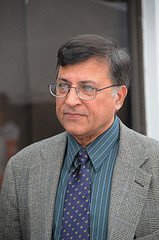Pakistanis must stand up and not give in to individuals like Pir Afzal Qadri or Khadim Hussain Rizvi and groups like Tehreek e Labbaik Pakistan (TLP). This is the message that leading Pakistani activists and intellectuals are trying to put out.

In his latest column Pervez Hoodbhoy states: “Pakistan must firmly reject the rule of religiously charged mobs. Instead it should aspire towards becoming part of civilised, cosmopolitan world society. Surrender is not an option.”
Hoodbhoy refers to the “inflammatory video filmed just after the Aasia Bibi verdict” that “received well over five million views. Therein you can watch the TLP leadership calling for the murder of the three Supreme Court judges who dismissed blasphemy charges against Aasia; hear that officers of the Pakistan Army should revolt against COAS Gen Qamar Bajwa; see the country’s prime minister being called a “yehudi bacha” (‘Jewish child’); and listen to the call for overthrowing the PTI government.”
As Hoodbhoy rightly points out: “Had a call for murder and mutiny been made by any other members of Pakistani society, unimaginable punishment would have been meted out. Similarly for other countries: in the United States instigators of bloody insurrection would be locked up for years; in Iran or Saudi Arabia they would be hanged or beheaded; and in China they would mysteriously disappear. And in India? Similar, I suppose. A similar open call for murder and mutiny by other Pakistanis would meet extreme punishment. But we in Pakistan are apparently nicer, kinder people. Our normally voluble, judiciary suddenly lost its voice. Unlike with errant politicians, the Supreme Court did not dock TLP leaders for contempt of court. The ever-vigilant ISPR also somehow missed hearing the call for mutiny against the army’s top leadership. Instead, it pleaded for “an amicable and peaceful resolution” of the Aasia Bibi matter because it “does not want the army dragged into the matter”. And the prime minister? Against the ‘enemies of the state’ his fighting words and body style initially drew wide approbation. Some liberals bravely termed this Imran’s finest hour. But the hour lasted an hour and no more; what started with a roar ended with a whimper. The TLP’s flaccid half-apology was accepted, ignoring the lives lost and property damaged by the rioters.”
Further, “The state’s reluctance to confront clerical power makes its earlier promises ring hollow. Take, for instance, madressah reform. Forgotten is the anti-terrorism National Action Plan that called for financial audits of madressahs, uncovering funding sources, curriculum expansion and revision, and monitoring of activities. That’s a dead duck. Try auditing TLP-associated madressahs.”
The question that Pakistan’s security establishment “must now ask itself hard questions: has its mainstreaming of religious extremism gone too far? Can extremists actually be moderated by bringing them into the political fold? On the political chessboard, was it a good move to try balance ‘hard’ Deobandi power with ‘soft’ Barelvi power?”
![]()





